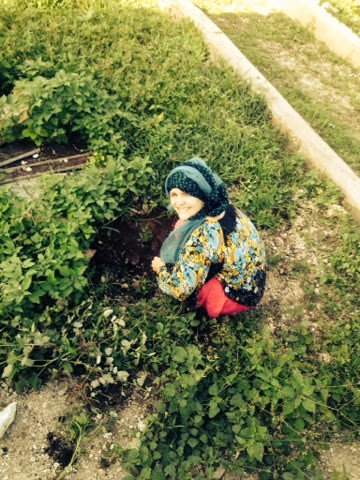It's a staple here. Great with rice and bread and I'm sure it would go super with ugali but hey, we're trying to be proper Zanzibari here, and for now this house runs on rice. Ideally mbeya. But that's another story.
So this week, mama mzungu (that would be me ;) has been making Aussiebarian mchicha, or mchicha wa mzungu. And it's been win so far. Both Mr Aussiebarian and little brother approve :) Woo!
So here we have it.
Aussiebarian Mchicha
Ingredients:
Mchicha, a bunch.
Garlic (I use about 5 cloves, or more. Helps keep the vampires away)
Onions.
Tomatoes.
Ginger. I like an inch or an inch and a half, but don't tell the Swahili folks cos they don't think ginger goes in mchicha. But I think it balances things out and frankly they don't seem to notice so much.
Coconut milk powder (yes I know this is cheating, but the only mbuzi in the house is me when I'm cheeky. So no grating coconuts for milk for now).
Pepper (again, don't tell the locals. They'll taste it and then realise the goodness).
Salt.
Capsicum, carrot (cut up until barely recognizable: super fine): optional, but good! This kind of works as a hidden veggie recipe
Wheat flour for thickening (I'd use something else but we have wheat, so that's what we use).
Method:
1. Get your minions (husband, brother in law, anyone but you) to tear up and wash the mchicha and cut up the stems while you cut the veggies up and grate the ginger.
2. Soften the onion and garlic in a touch of oil on high heat in your big pot.
3. Add the mchicha and other veggies and some coconut milk powder mixed up with some water.. I start with 3/4 of a bowl and add a bit later if required but the veggies all release a bit of liquid. Add a little ginger, salt and pepper.
4. Bring to the boil, adding the rest of the mchicha leaves as the others wilt down to make room in the pot, mixing and stirring as you go.
5. Add the rest of the ginger, cover and simmer for a few minutes.
6. Just before serving thicken with a paste made from pan juices and a little cold water added to what seems like a ridiculous amount of flour. It makes it like a yummy coconut tomato gravy :) not Zanzibari but the boys aren't complaining. If you have too much, you can mix the leftover mchicha juice and flour paste with some extra water and fry it into what I like to call mchichapati!
7. Serve!
With just onion and tomato
Glossary:
Mzungu: European/white person (not derogatory)
Mchicha: Swahili spinach
Mchichapati: what you get when you cross mchicha with chapati: see step 6.
Mbeya: a type of rice. The favorite for eating plain as a.. I'd call it a side dish but it's really more like a spoon. Also a city on the mainland but I'm yet to find out if there's any connection.
Ugali: kind of a cross between powdered potato, bread and porridge. Corn meal or cassava meal cooked into a thick ball. A better spoon than rice. Zambians call it nshima.
Mbuzi: 1. A coconut grater - needed to get coconut milk out of an old coconut. 2. Goat(s). 3. Slang for a cheeky person.




















